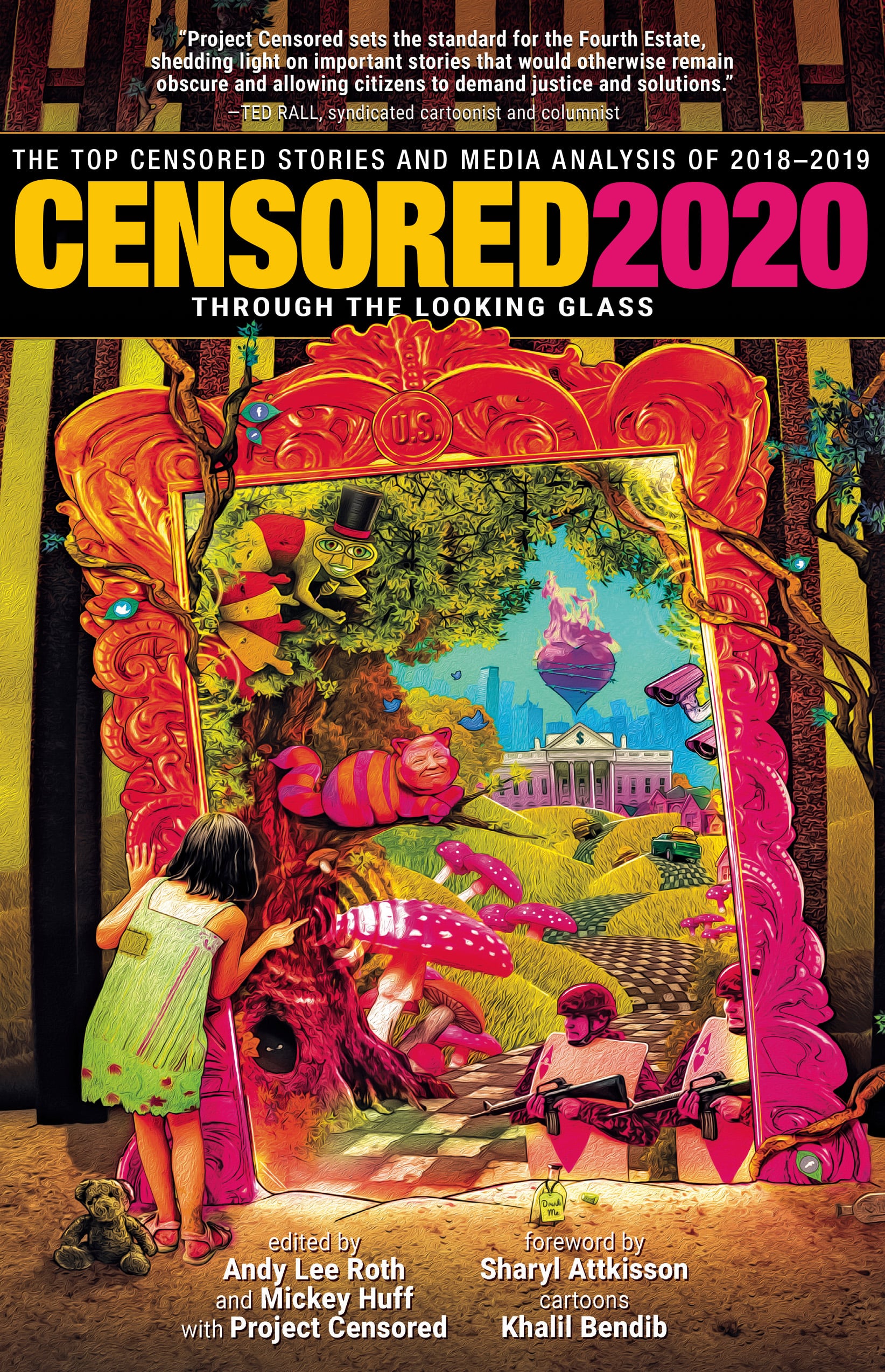In mid-October, one day after Twitter and Facebook banned a story by the New York Post about a laptop alleged to belong to Hunter Biden, YouTube published a short announcement on its blog called “Managing harmful conspiracy theories on YouTube” where new “efforts to curb hate and harassment by removing more conspiracy theory content used to justify real-world violence.”
In the official statement, the Google subsidiary defined the terms of its growing model of censorship:
Today we’re further expanding both our hate and harassment policies to prohibit content that targets an individual or group with conspiracy theories that have been used to justify real-world violence. One example would be content that threatens or harasses someone by suggesting they are complicit in one of these harmful conspiracies, such as QAnon or Pizzagate.”
The video streaming platform’s recent expulsion of several popular channels such as The Last American Vagabond, which provided political commentary on controversial topics and had accrued a large following over the last few years, were booted from the site in a purge that continues apace as the 2020 election saga unfolds. A week after the October 15 YouTube blog post, Patreon followed suit, revealing their own plans to “address the QAnon conspiracy theory” on the crowd-funding platform for content creators in a move that underscores the economic consequences for people creating content that runs afoul of establishment narratives.
The increasing boldness of private corporations to restrict speech that is allowed on platforms that profit almost exclusively from the hard work, creativity, and data of the users who sign up for them, is just one of the important issues that Project Censored Director Mickey Huff has been fighting to change for years. Huff joined MintPress to discuss the increasing crackdown on free speech online and much more.
A fight that’s just beginning
Huff describes Project Censored as a “critical media literacy education organization,” that supports “transparently-sourced, fact-based reporting in the public interest” in both independent and so-called ‘mainstream media’ – a term he takes exception to, –preferring the more accurate label of ‘corporate media’ to distinguish between the twin currents that drive our post-Internet media landscape.
Founded in 1976 by Prof. Carl Jensen as a media research program at Sonoma State University, the program has matured into one of the pillars of watchdog activism in America, with hundreds of students across the country participating and collaborating with judges and affiliates in other universities to take on the daunting task of keeping the media honest and committed to the exercise of a free press.
Ever since 1993, Project Censored has published an annual tome highlighting the year’s top censored news stories. Last year’s book, titled “Censored 2020 – Through The Looking Glass,” addressed the real agenda behind the issue of ‘fake news‘ and rampant disinformation campaigns, which serves the most powerful interests in corporate media and are now at the center of the partisan narratives being disseminated via federal agencies as we approach the November 3.
MintPress asked Huff about what he called the “rank partisanship hypocrisy” surrounding the present state of American media and the true nature of the bias displayed by news outlets and social media platforms, like Twitter, Facebook, and YouTube, in particular, which continue to come under increased scrutiny over their intensified efforts to deplatform and censor along seemingly partisan lines.
“There is a bias,” states Huff. But, according to the head of Project Censored, the bias leans “towards establishment politics, in general, and what’s best for Silicon Valley,” as opposed to the common perception held by many conservatives, that right-wing views are more likely to be nixed from the endless stream of online content.
Huff concedes that the Brahmins of Big Tech are far more likely to gravitate to neo-liberal ideas, but insists that censorship of left-wing voices has not been mitigated by such factors, either; pointing to the equally-influential role of right-wing billionaire networks and the arch-conservative makeup of players in the military-industrial complex, who have been going to far greater lengths to suppress left-wing ideas and movements for decades. “If Republicans and conservatives are really concerned about money in Silicon Valley and impacting elections,” says Huff, “they should look in the mirror.”
Who’s on first?
The Trump-Russia political cosmology that has dominated corporate media and has lived rent-free in the minds of millions of Americans on social media was a feature from the start of the 2016 presidential race. The Mueller investigation solidified the state’s intention to vilify Russia and other perennial geopolitical targets of the U.S. by using its own bumbling Yeltsin clone to manufacture a tenuous threat to American “democracy.”
Social media platforms have played an essential role in circulating and reinforcing the tales of Russian election interference. MintPress asked Huff about these claims, as they are now being weaponized by the establishment to justify a broad, yet selective, deplatforming policy of dissident voices in collusion with the owners of the social networks, themselves.
“Are there foreign countries interested in manipulating or influencing U.S. elections? Of course,” Huff said. But, questioned “to what degree or net effect” any such interference could possibly have considering what the data shows.
“If you actually go and take a look at that election cycle for context, Russian ads amounted to .0004% of the total content on Facebook and represented only 1 of 23,000 Facebook newsfeed posts. Between 2015 and 2017, Facebook blocked 33 trillion posts, and the Internet Research Agency generated 80,000 of them.”
As for the persistent cries from conservative circles about a liberal conspiracy to shut down right-leaning social media channels, “it turns out that right-wing propaganda and right-wing voices are actually louder on Twitter and Facebook. They get retweeted more,” Huff states.
The reality seems to reflect an equal opportunity approach to censorship that Huff qualifies as “a bipartisan effort to control the public narrative,” and accounts for the fact “that people further to the right and further to the left are marginalized and are kept out of the discussions and debates.”
Huff cuts social media companies some slack, but only in light of their ability to incorporate so-called “community standards,” which are vague and open-ended notions of civility Big Tech has used to police user activity in their TOS agreements. “There is some content, particularly on the far right that is very xenophobic or racist and that’s very problematic,” he admitted. “But, we need to talk about how to best handle those types of situations if we want to protect free speech.”
The E-plantation
“We are heading into a neoliberal dystopian morass ruled by technocrats and plutocrats where data is the new currency like oil, and we are all being used by these companies on their circuit board plantations.”
Huff’s use of the plantation model as an analogy for the algorithmically-controlled digital ecosystem currently under construction is more than apt, considering the exploitative dynamic that undergirds the billions of dollars generated by these enormous concerns with, essentially, free labor from millions upon millions of content creators.
“It’s in the interest of the owners and investors of these companies to control content to the degree to which it affects their profit margin,” Huff noted, but highlighted the deliberate intention to create “a group of addicted users, so that they would willingly be used in ‘Huxleyan’ style to grow to love our servitude through the telescreen.”
“The people that designed these platforms knew what they were doing,” he continued, adding that the lopsided power dynamic represented by powerful private corporations and millions of content (and data) slaves they profit from is “a real conundrum,” because “most of the general public has no idea how these systems work and tech companies haven’t exactly been forthcoming about how their own [proprietary] algorithms and bots work.”
Ultimately, Huff believes society “can’t really get to the root of that whole problem unless we look at the problem of global corporate capitalism and racial capitalism, as it exists as a system of global oppression.”
Break on through
Understanding the technical aspects of how these platforms and their technology really work is vital to our ability to fight back against their relentless encroachment into our lives and society, as a whole. Both the expectation of privacy and freedom of expression are under simultaneous attack by a burgeoning technocratic superstructure, which is being set up at many levels of our material reality through 5G and related information communications technologies.
The AI revolution being instigated by supranational organizations like the World Economic Forum and their powerful partners demand a new censorship paradigm that can restore the fourth estate to its former glory in a hyper-communicated world by drowning out the inconvenient truths dug up by pesky independent researchers, journalists or any individual with a mind of their own and access to a treasure trove of online sources.
Huff points out that “the kinds of censorship that take place online, particularly in social media or in search engines is often algorithmically driven.” While this fact undermines a broader perception of the evil tech CEO mastermind, such as the “idea that [Jack] Dorsey or [Mark] Zuckerberg get out the red pen and start scratching names off of a list somewhere,” the “net result” is the same, according to Huff.
“It’s not just the think tanks and hired guns that go and excise in their confirmation bias fashion,” he explains. But, on the other hand, moves at the federal level to step in and regulate social networks – such as the recent rumblings over Section 230 of the Communications Act – could be a case of jumping from the fire into the frying pan.
“If we assume that, somehow, government is more of an objective observer, with all the K-street money and lobbying and big tech sector money and everything else that goes in there, it’s almost like a shell game.” Trying not to come off as too cynical, Huff nevertheless believes that if we are to assert our collective will over the interests pushing us into a dystopian nightmare of perpetual surveillance and censorship, tweaks to a few lines in the U.S. Code is not going to be enough.
Huff is unambiguous about his own particular vision about how we can solve these modern riddles of power: “We need long term strategies for critical media literacy education and civic engagement.” Project Censored and its parent, the Media Freedom Foundation, are carrying this vision forward by edifying the general public about these problems “in a way that’s not indoctrinated, that’s based on critical pedagogy to understand systems of power and oppression and use media as a way of informing and teaching the public to have our voice heard loudly enough in these oligarchic sectors.”
Despite the daunting nature of such an endeavor, Mickey Huff is undeterred and takes inspiration from Ralph Nader’s words to forge ahead: “We need to break through power and it’s easier than we think.”
Mickey Huff is the current director of Project Censored, founded in 1976, and president of the nonprofit Media Freedom Foundation. He is a professor of social science and history and executive producer and host of The Project Censored Show on Pacifica Radio. He serves on the editorial board for the journal Secrecy and Society, and is a board member of Behind the Headlines.
Project Censored’s newest edition of the year’s top censored news stories, “State of the Free Press | 2021” is due out December 1st. It’s latest documentary, “United States of Distraction: Fighting the Fake News Invasion” is available online.
Feature photo | Graphic by MintPress News
Raul Diego is a MintPress News Staff Writer, independent photojournalist, researcher, writer and documentary filmmaker.



